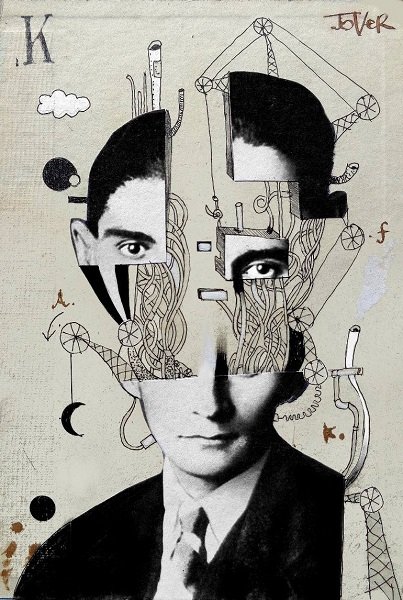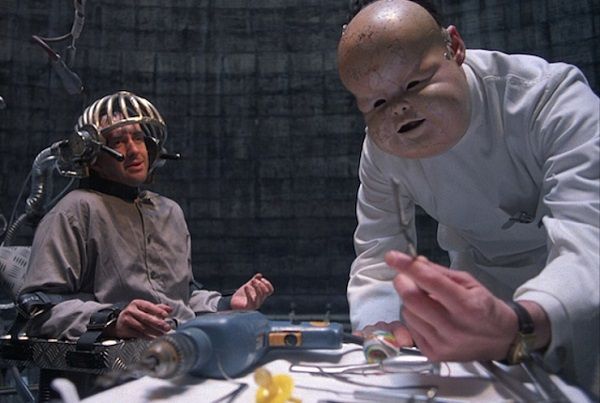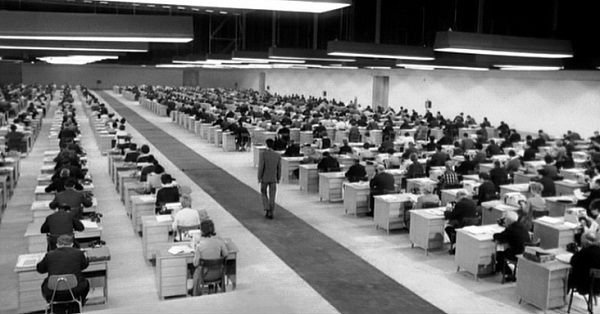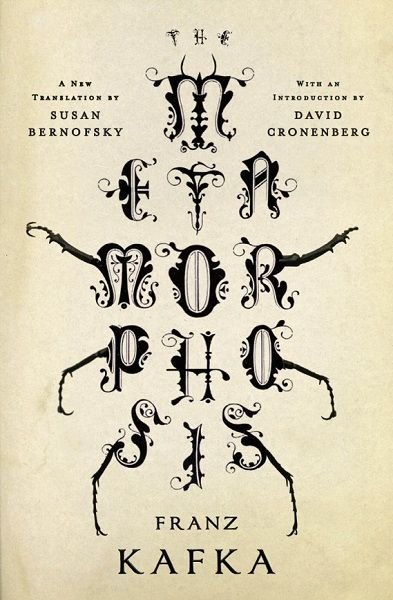Kafka and his influence

How does the absurdity of the Austro-Czech writer's prose inspire pop culture today? We may know Kafka for his darkness and absurdity, but he is not entirely - and not even most - darkness and doom. He loved too deeply. As the existential darkness in him is inspiration to others, love is what inspired Kafka.
The writer of absurdity, Franz Kafka, may have died more than ninety years ago, but his presence is felt today - or at least his powerful influence over artists from all over the world. A recent month's news of a Kafka theater festival in Chicago is proof of that. And Google returns 465,000 search results for kafkaesque - an adjective explained by the dictionary "Merami-Webster" as "from, related to or suggesting Franz Kafka or his works; mostly having a nightmare complex, strange or illogical qualities. "
Many authors and directors choose to look at the absurdity and shaving humor of Kafka's prose, and if some of us can only be unclear about his own literature ("Metamorphosis", for example, published a hundred years ago), the works of some of his creative heirs are quite popular today
In the cinema, director Terry Gilliam is perhaps Kafka's greatest lender. His masterpiece of bureaucratic surrealism "Brazil" (1985) is so "kafkianism" with his atmosphere depicting an unhappy ordinary man caught in prison at his workplace. The little hero in the absurd but omnipotent bureaucratic cell Gilliam looks back at "Twelve Monkeys" since 1995. There, the subject can be flipped lightly alongside the science-fictional element in the film, but if nothing else - the barely controllable travel technology over time, confused memories and intricate time lines lead to the heart of history near Kafka.

Terry Gilliam's "Brazil"
The work of the brothers Joel and Ethan Cohen lags a little from Gilliam in this respect. Over the last decade, the unusual humor movies such as "O Brother, Where Art Thou?" (2000) are overshadowed by the more grim and existential troubled "Serious Man" (2006) and "No Country for Old Men " and the two heroic men dragged into the swivels of the chaos and the absurd, killing just under the tranquil surface of everyday life.
Portraits of the writer himself are in films that mix a biographical and artistic element. Director Steven Soderbergh filmed Kafka in 1991 starring Jeremy Irons as the writer. Kafka's presence in cinema can hardly be divided thematically, but there are films directly based on his works. In 1962, Orson Welles puts his novel "The Process" on the big screen.

"The Process" by Orson Welles
Kafka's literary impact is even more apparent. A number of writers draw inspiration from the relatively small body of the author's works - many of which have not even been published before his death.
Several of the bizarre but brilliant works of fantasy writer Jeff VanderMeer play with the thorny conundrum inherent in Kafka. In the book "Situation" employee in a bio-technology cabin slowly transforms into something beautiful, but strange to others. It is hard to look at this novel and not to see at least a few autobiographical elements - before it becomes very popular in 2014 with its Southern Touch trilogy (Danny Boyle even announced that he would direct the film from one of his books ), VanderMeer has worked for a similar office, while at night he has accumulated the accolades as a writer and invited to attend conferences around the world.
The popular Japanese author, Haruki Murakami, well-known for his metaphysical bias, has been silencing the world with his novel, "Kafka on the shore" since 2002. Kafka Tamura, 15, leaves home, trying to escape the troubled Oedipus complex imposed on him by his father. During his journey, he finds his long lost mother, then he is suspected for murder and finds refuge in a private library. The journey of Tamura meets him with Nakata - a mentally disabled person with the enigmatic ability to talk to cats.

Is Kafka's name the most Kafkian element in "Kafka on the shore"? It is controversial. It is complicated by the fact that Kafka is not even the birth name of Tamura - he chooses him for his love of the story "In the Penal Colony." Yet more connections, however weak they may be.
In the "Kafka on the shore" creature that took the form of KFC's talisman Colonel Sanders advises:
"If you think God's there, He is. If you don't, He isn't. And if that's what God's like, I wouldn't worry about it."
This can be compared with the following passage from Kafka himself, published in the Aphorisms - "It is possible to know of the devilish but not to believe in it, becasue there is no more devilishness that exists anyway." Deliberate counterpoint? Unlikely, but both quotes are captivating enough to see the contrast between them.
The name of the great writer is borrowed again by the literary critic, bookwright and chronicler of the Bohemian scene of the post-war New York Anatole Broyar, who baptists his unfinished memoir "Kafka was anger." Broyard obviously praises Kafka, as well as many other writers. However, he is better known for the authors he dislikes - those who fail to meet his standards are becoming the subject of legendary bile reviews.
Broyar's relationship with Kafka may seem bleak, but his personal life has his share of Kafkyan elements. The origins of criticism are mixed, and some of his peers criticize him for taking advantage of his light skin to "pass by default" as white. If so, a man of the dark-skinned race to direct the literary world, at that time composed mostly of white, would have to be a problematic and sometimes even absurd endeavor.

In his book "The Lover Kafka," Jacqueline Ray-Duval collects parts of the writer's passionate correspondence with four of the women he loved. He was engaged to each of them at different times, but never reached the altar. In each case, he breaks things up and writes a novel instead.
As a writer, so focused on suffering, Kafka must have been aware of the misery he has poured upon these women. Maybe one last aphorism will put his actions in context:
"You don't have to go out of the house. Stay on your desk and listen. Even don't listen, just wait. But do not wait, be self-conscious. The whole world will be revealed without a mask, there will be no choice, and it will be written while you are in ecstasy. "
This gem of a post has been discovered by the Operation Curation Delegation (OCD) team!
Reply to this comment if you accept, and are willing to let us share your gem of a post! By accepting this, you have a chance to receive extra rewards and one of your photos in this article may be used on our compilation post!
You can follow @ocd – learn more about the project and see other Gems! We strive for transparency.
Sure, that would be nice. Thanks!
This post recieved an upvote from minnowpond. If you would like to recieve upvotes from minnowpond on all your posts, simply FOLLOW @minnowpond
I love most of the Cohen movies, and Brazil is an all-time favorite of mine. But I had never thought of the relation to Kafka, probably I must read him again. Your review was very inspiring, and urged me to go get some of his books, thanks!
Btw, that book cover for Metamorphosis is awesome!
Thank you for that comment. Yes, Kafka has influence on many artist, this it just a little part of them. I want to share with you one japanese animation from Kafka's "A Country Doctor". I think you will like it
Very interesting post! I really love Kafkas works and Brazil is also one of my all-time favorite movies. Do you know the Kafka-Band? I wrote a blog about them some time ago. Maybe it's interesting for you.
No, i didn't know! Thank you for sharing, i like their style, reminds me a little bit of the brit band - Pulp . :)
Good stuff, Metamorphosis shaped/twisted my thinking from a fairly early age.
Cheers, A.
Thanks mate. Cheers!
if one wants to get to the bottom of the Kafkaesque soul, the best source are his personal diaries and letters, and the most revealing of those sources is his letter to the father. I have translated most of the 100 page letter from the original German language into English. If you are interested, I will leave the link to the video just in case ;)
Thank you very much for sharing the video with me. The letters of Kafka are so deep and shaking. Unfortunately, from his diaries has been translated too little in my language, and I really want to read them completely.
What language is that? Another thing to keep in mind is that Kafka has a very special way to use the words and build the sentences, and the underlying emotions can not be transported completely into a different language. For example, something not many people are aware of, is the fact that Kafka is quite a brilliant comedian. But it's precisely this very fine, subtle humor, that is often not even seen by translators who are not native German speakers. However, reading his diaries in any language should be a fascinating journey nevertheless :)
Yes, I feel his humor, but very rarely. In Nikolai Gogol I think it's something like that, but I laugh at his works aloud, though the stories are sad, his humor is very distinct. Chekhov had this problem that people thought he was writing tragedies and wondered why they did not laugh at what he wrote. In my opinion, it is not only the language, but also the mentality of people to capture the humor, because it is also very specific. Otherwise, the language I read Kafka is bulgarian.
I totall agree with you! I love the Russians, and I laughed tears at the Petersburger Tales. You are correct, it is a question of the mindset. I find Chekhov also to be a very big romantic :) Just like Dostojewskij, who is a huge romantic underneath his brilliant insanity.
Do you know the Master and Margarita?
Otherwise, I don't speak any bulgarian.
Mikhail Bulgakov, yes. I adore Master and Margarita, but the funny thing is that I have a prejudice because the book is so good and I do not want to read anything else from him not to be disappointed if it's not so good as "Master and Margarita" ... So many great Russian writers we have that I do not even need to start to enumerate them and they have much to do with Kafka's world. Maybe we can mention in this way "Invitation to a Beheading" from Vladimir Nabokov.
Oh.. and one not so popular thing - Bulgaria gave the cyrillic to the world and Russia so they could write those :)
My sister studied Eastern European languages, literature and culture and she introduced me to all these writers and also Master and Margarita, which is for both of us the best book ever written. Bulgakov also loved Goethe very much and there is a lot of Faust in the Master and Margarita. I also watched the Mini series probably more than ten times. The Invitation to a Beheading is new to me and I will look for it, I have heard the name Nabokov but haven't read anything of him. Thank you very much for the recommendation.
Funny thing, I do have two other books by Bulgakov which I also have not read because I think too that the Master can not be topped. The Russian writers from Gogol to Bulgakov do have a Kafkaesque touch, I agree.
The origin of our letters is a very interesting subject and I believe the origin lies in the Runes. Runes are ancient European symbols and the cyrillic alphabet may very well have come out of it. The Runes also have many similarities to the "Latin" alphabet, which in my opinion is not Latin at all ;)
Yes, I also think it's the best book ever written. But the strange thing is when I read other authors and I love the book they wrote, I always read everything else from them. With Bulgakov it's different. And as I see it was the same with you. I don't know why, maybe we are afraid of cracking the perfection of his masterpiece.
Nabokov is a mandatory author. You will be surprised by his book "Invitation to a Beheading", which I recommended. The book have from Kafka's spirit, but not only. It's original and in my opinion it's the greatest work of the 20th century.
Very nice post ;) I really liked reading Kafka and I think the movies related with his literature are great too. Resteemed and Followed ;)
Thank you! :) I recommend you to look at some theatrical play of his book.
They are also very interesting and deserves attention.